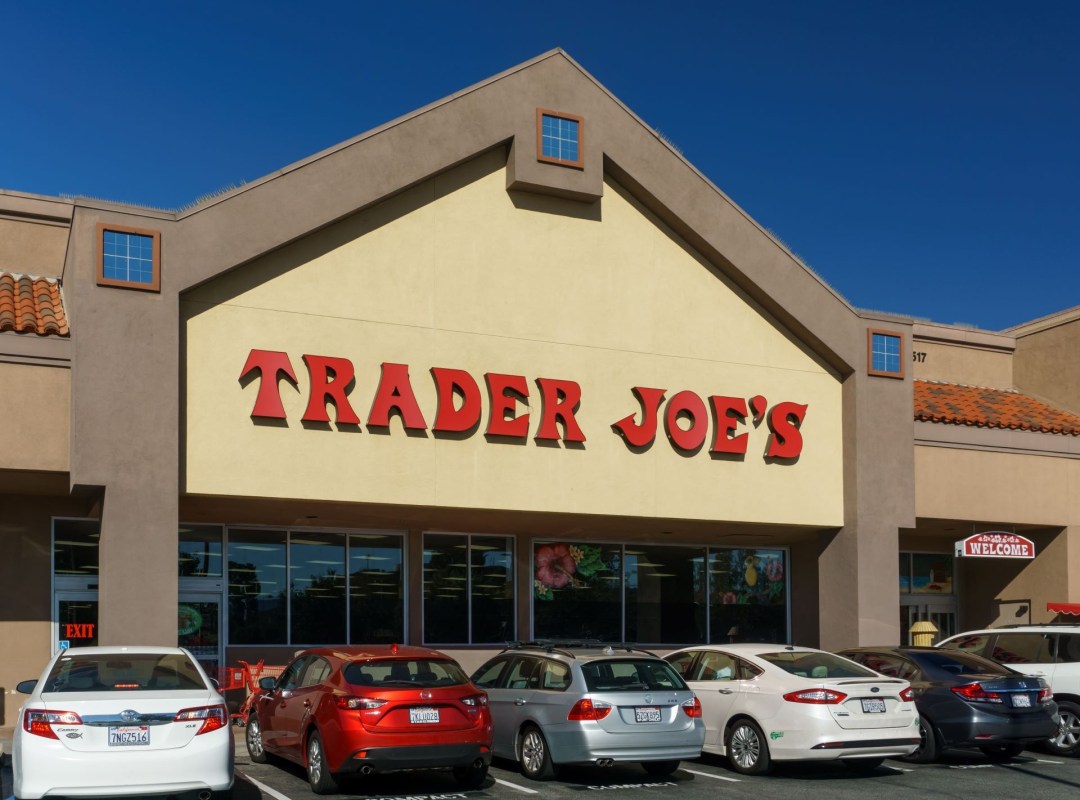Trader Joe's is an eclectic grocery store chain known for its loyal fanbase, unique food items (see: Speculoos Cookie Butter), and quirky in-store culture.
Still, one of the less redeeming facts about TJ's is that, like many grocery stores, it uses an excess of plastic packaging. In recent years, though, it seems like the iconic grocery chain has found ways to clean up its act.
A trashy start
In 2021, a Brightly analysis of popular chain stores ranked Trader Joe's as the least sustainable of seven stores — including America's largest retailers: Costco, Target, and Walmart.
Brightly awarded TJ's with a dismal score of 14 out of a possible 50, largely due to its apparent underperformance in categories like in-store recycling, efforts to reduce waste, and adopting clean energy.
Such a poor sustainability ranking contrasts the eco-friendly brown paper bags and farm-to-table aesthetic that many people associate with the grocery chain.
One of the store's biggest offenses is its plastic bags and packaging materials. "At TJ's, everything from bell peppers to tea bags may come encased in plastic film," Brightly stated in a 2021 blog post reporting its findings.
In 2022, Climate-Friendly Supermarkets also ranked TJ's as one of the least sustainable stores, in part because the chain doesn't disclose how much pollutant-filled hydrofluorocarbons (HFCs) it produces — gases used to keep foods cold during refrigeration.
How is Trader Joe's cleaning its act up?
In recent years, though, there have been some bright spots.
For one, Trader Joe's donates nearly 100% of its perfectly edible products that end up going unsold, thanks to its Neighborhood Shares Program. These donated goods go to local food recovery organizations and several community-based non-profit partners that provide food to those in need.
In 2022 alone, Trader Joe's donated 85 million pounds of food — $411 million worth of products — to its non-profit partners across the U.S.
This program helps the planet, too. Nearly 40% of all food in America gets wasted. That's like throwing 130 billion meals away each year. Reducing the amount of food sent to landfills helps to limit the amount of carbon pollution entering our air.
Trader Joe's has also been scaling back single-use plastics. Per a sustainability fact sheet on its website, Trader Joe's has removed more than 12 million pounds of plastic packaging from its products.
This success comes from removing plastic mesh packaging from produce, replacing more plastic clamshells with a sealed fiber tray, ditching plastic rings from six-packs of beer, incorporating more recycled plastics, and more.
The chain also touts its responsible resource management practices. In 2022, it claims to have recycled 4.6 million wood pallets, over 311 million pounds of cardboard boxes, and more than 277 million pounds of plastic.
Why should we care about TJ's sustainability?
On an individual level, the excessive packaging is simply annoying.
Zooming out, this trash contributes to the global plastic pollution crisis. A mere 5% of plastics get recycled in the U.S., leaving the nearly 80 billion pounds of plastic trash thrown away each year in this country with nowhere to go.
And because plastic never decomposes, it continues to break down into smaller pieces called microplastics that have made their way into the water we drink, the food we eat, and even our bodies.
If Trader Joe's can keep its promises about reducing single-use packaging, it can help to alleviate some of these pollution problems.
Meanwhile, HFCs — those dangerous gases TJ's uses to refrigerate its products — are planet-overheating gases that are hundreds to thousands of times more potent than carbon air pollution. So keeping the grocery chain's polluting gases in check is also incredibly important.
How to shop more sustainably at Trader Joe's
Meredith Bay Tyack, who runs the sustainable lifestyle blog Meredith Tested, says there are ways to shop around every grocery chain's unsustainable practices.
"You can absolutely shop with reducing trash in mind at any supermarket," Tyack writes in a blog post.
For shopping at Trader Joe's, Bey first recommends buying produce whole — as opposed to the pre-cut options, which usually come in plastic packaging — then cutting or preparing it at home to avoid unnecessary plastic bags.
"I don't love the idea of my food sitting in plastic," she adds.
Tyack opts for products packaged in glass or paper products — or items with no packaging at all. And of course, one of the easiest options is to bring reusable bags for produce and groceries.
Join our free newsletter for cool news and actionable info that makes it easy to help yourself while helping the planet.









